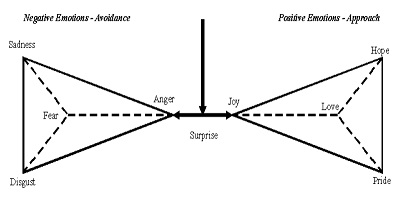What is an Emotional Dialectic?
Among a myriad of other aspects of what a dialectic is or what dialects are it will suffice as an introduction to day that the answer to this question is that a dialectic is the juxtaposition of interaction of conflicting ideas or as in our focus here, conflicting thoughts and emotions which can lead to conflicting behaviour or actions taken or not taken.
For many people their individual experience or relationship to their own emotions, to varying degrees, along a spectrum of emotional experience, consciously or subconsciously, are dichotomous. When your emotions are experienced as dichotomous it means that you are experiencing them in one of the two opposing ways in which they can be divided.
Emotions can be divided mainly by positive or negative. Many know this division of their own emotions as being judged by them (often subconsciously) as “good” or “bad”. Some people focus only on the positive or “good” emotions they are aware of or in touch with. Others focus only or mainly on the negative or “bad” emotions they are aware of or in touch with or even afraid to feel.
This means that if you are either denying your emotions altogether or you are experience only one side of how you feel “good” or “bad” or positive or negative that you are in the conflict of what is actually the absence of an emotional dialectic.
It is the juxtaposition of your emotions, positive, “good”, negative, “bad” held divided or felt and/or perceived in contrast or as opposing each other that you lose the emotional balance of the middle-ground. The dialectic of the mixing of feelings and emotions that can be positive and negative but more importantly will be more balanced if they are not judged as being either contracted or compared as positive or negative but rather felt and accepted as just being what you feel. The feeling of the conflicting emotions at the same time – holding a paradox – is what is necessary to learn in order to truly experience the emotional harmony and balance of what it is to feel your own emotional dialectic at any given time.
The Absence of an Emotional Dialectic Causes Intensity of Emotions To Rise
In the absence of a mindful radically accepting awareness of the conflicting emotions we all have with varying degrees of frequency one might really be unaware of how they actually feel or why. Secondly, the focus on the perception and experience of either positive or negative emotion – out of balance – dichotomous emotion versus dialectical emotion – causes the intensity of emotion to rise. One might feel too much positive for what his or her current situation is. One might feel way too much negativity for what his or her current situation is.
What drives the intensity of our emotions is largely one or two things.
1) We are not aware of how we feel or we are afraid of our feelings and tend not to deal with them
2) A constant unyielding focus on one side or the other of how emotions can be experienced.
The lack of mindfulness and radical acceptance of emotions for so many people and/or ignoring how they feel, drinking, taking drugs, eating, or doing something else to push away or shove down deeper how one feels, for example, creates much more intensity in these ignored feelings. Even if you are aware of your feelings but perhaps feeling scared of them or overwhelmed at starting to feel anything it is because you are feeling and focusing so much on only one side of all of your emotional reality – perhaps you are only aware of one side – and often than divided way of feeling or being somewhat aware of your emotions that is not emotions experienced within an emotional dialectic makes for such intensity and perhaps fear that you want to just escape feeling any or all emotions.
What you think creates how you feel. What you focus on creates how you think. The more you focus and think about something, anything, the more it will drive how much more intensely you will feel or have to fight to not feel certain emotions.
It is healthier to learn how to build the skills of recognizing and being mindful and aware along with radically accepting of your own emotional dialectic at any moment in time. Just thinking about opening up to that and to your emotions more fully in all that can mean to decrease emotional reactivity, impulsive and often unhealthy behaviour that your emotions can motivate. Not to mention the ways in which your emotions can negatively impact you and also your relationships if you are outside your own emotional dialectic and unaware of how your emotions and the thoughts behind them have direct connections to the ways in which you relate to your self or not and to others in ways that support, build, and strengthen connections/relationships or tear down, distance others and/or disrupt or even destroy connections with or to others.
Copyright A.J. Mahari, April 21, 2014 – All rights reserved.


